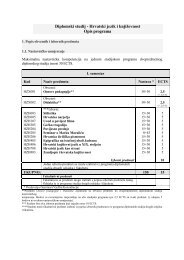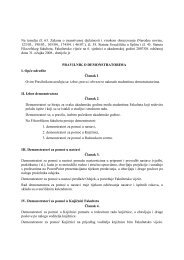Understanding Human Communication
Understanding Human Communication
Understanding Human Communication
Create successful ePaper yourself
Turn your PDF publications into a flip-book with our unique Google optimized e-Paper software.
letes,not to mention the simple goal of having fun—of playing in the recreational<br />
sense of the word.You can probably see that if the coach or team members<br />
took a simplistic view of the situation, looking only at the team’s win-lose<br />
record,analyzing player errors,training methods,and so on,some important problems<br />
would probably go overlooked. In this situation, the team’s performance<br />
could probably be best improved by working on the basic problems—the frustration<br />
of the players about having their personal needs unmet.What’s the<br />
moral here? That the way to start understanding a group’s problem is to identify<br />
the concerns of each member.<br />
What about groups who don’t have problems? Several friends planning a surprise<br />
birthday party and a family deciding where to go for its vacation don’t seem<br />
to be in the dire straits of a losing athletic team:They simply want to have fun.<br />
In cases like these,it may be helpful to substitute the word challenge for the more<br />
gloomy word problem. However we express it, the same principle applies to all<br />
task-oriented groups:The best place to start work is to identify what each member<br />
seeks as a result of belonging to the group.<br />
ANALYZE THE PROBLEM After you have identified the general nature of the<br />
problem facing the group, you are ready to look at the problem in more detail.<br />
There are several steps you can follow to accomplish this important job.<br />
Word the Problem as a Probative Question If you have ever seen a formal debate,<br />
you know that the issue under discussion is worded as a proposition: “The United<br />
States should reduce its foreign aid expenditures,” for example. Many problemsolving<br />
groups define their task in much the same way. “We ought to spend our<br />
vacation in the mountains,”suggests one family member. The problem with phrasing<br />
problems as propositions is that such wording invites people to take sides.<br />
Though this approach is fine for formal debates (which are contests rather like<br />
football or card games), premature side taking creates unnecessary conflict in<br />
most problem-solving groups.<br />
A far better approach is to state the problem as a question.Note that this should<br />
be a probative question—an open one that encourages exploratory thinking.<br />
Asking,“Should we vacation in the mountains or at the beach?”still forces members<br />
to choose sides. A far better approach involves asking a question to help<br />
define the general goals that came out during the problem-identification stage:<br />
“What do we want our vacation to accomplish?” (that is,“relaxation,”“adventure,”“low<br />
cost,”and so on).<br />
Notice that this question is truly exploratory.It encourages the family members<br />
to work cooperatively, not forcing them to make a choice and then defend it.<br />
This absence of an either-or situation boosts the odds that members will listen<br />
openly to one another rather than listening selectively in defense of their own positions.There<br />
is even a chance that the cooperative, exploratory climate that<br />
comes from wording the question probatively will help the family arrive at consensus<br />
about where to vacation, eliminating the need to discuss the matter any<br />
further.<br />
Gather Relevant Information Groups often need to know important facts before<br />
they can make decisions or even understand the problem.We remember one<br />
group of students who determined to do well on a class presentation.One of their<br />
goals, then, was “to get an A grade.” They knew that, to do so, they would have to<br />
CHAPTER 9 SOLVING PROBLEMS IN GROUPS 299<br />
CULTURAL IDIOM<br />
dire straits: extremely difficult<br />
situation<br />
boosts the odds: increases the<br />
chances of success

















